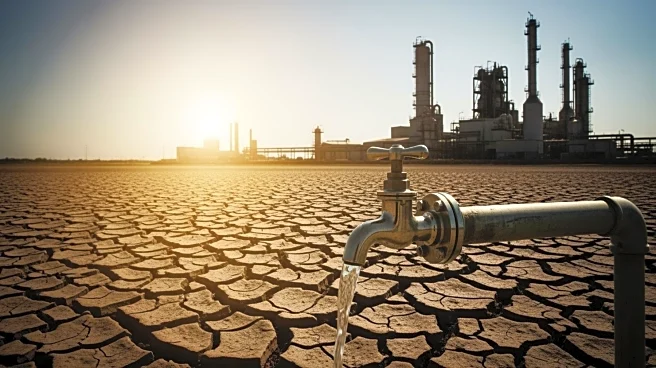What's Happening?
The ongoing drought in South Texas is posing significant challenges to the industrial sector in Corpus Christi, a key hub for oil and petrochemical exports. The city council recently halted the construction of a desalination plant due to escalating costs,
which has sparked controversy among residents and industrial stakeholders. The drought has led to water shortages, prompting restrictions on usage, and if conditions do not improve, further limitations may be necessary. Major companies such as Exxon Mobil Corp., Koch Industries LLC, and Occidental Petroleum Corp. are among the largest water consumers in the area, and the situation is exacerbating tensions between industrial needs and residential concerns.
Why It's Important?
The water crisis in Corpus Christi is critical as it affects the operations of major industrial players, which are vital to the U.S. economy and energy sector. The drought threatens to curb water supplies by up to 25%, impacting industries that rely heavily on water for production. This situation highlights the broader risks faced by the petrochemical industry amid environmental challenges and trade adjustments. The halt in the desalination project underscores the difficulty in balancing industrial growth with sustainable resource management, potentially affecting job creation and economic stability in the region.
What's Next?
The Corpus Christi city council plans to explore new options and approaches to secure a reliable long-term water source. Discussions are expected to continue later this month, focusing on alternative solutions to address the water shortage. Industrial companies are making contingency plans to mitigate the impact of potential water curtailments. The situation calls for innovative strategies to ensure economic growth without exacerbating the water crisis, and stakeholders are considering attracting businesses that require less water.
Beyond the Headlines
The water crisis in Corpus Christi raises ethical and environmental concerns about the sustainability of industrial expansion in drought-prone areas. The tension between industrial needs and residential water access reflects broader societal challenges in managing natural resources. The situation may prompt a reevaluation of water usage policies and encourage investment in technologies that reduce water consumption, potentially leading to long-term shifts in industrial practices.
















